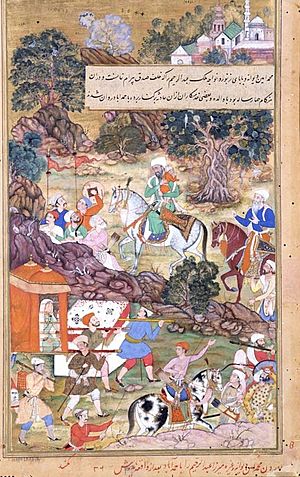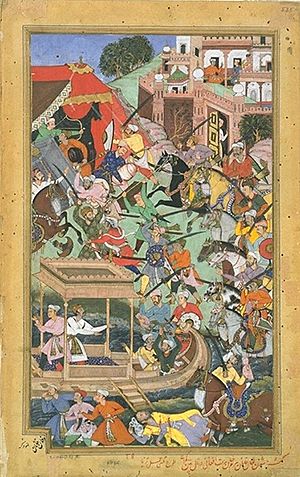Salima Sultan Begum facts for kids
Quick facts for kids Salima Sultan Begum |
|
|---|---|
| Empress consort of the Mughal Empire | |

Salima Begum and Abdul Rahim being escorted to Ahmedabad after Bairam Khan's assassination in 1561
|
|
| Born | 23 February 1539 |
| Died | 2 January 1613 (aged 73) Agra, Mughal Empire |
| Burial | Mandarkar Garden, Agra |
| Spouse |
|
| House | Timurid (by marriage) |
| Father | Nuruddin Muhammad Mirza of Naqshbandi Khawajas |
| Mother | Gulrukh Begum |
| Religion | Islam |
Salima Sultan Begum (born February 23, 1539 – died January 2, 1613) was an important empress of the Mughal Empire. She was the third wife and a chief empress of Emperor Akbar. Salima was also the granddaughter of Babur, who founded the Mughal Empire.
Salima was the daughter of Akbar's aunt, Gulrukh Begum. Her father was Nuruddin Muhammad Mirza, the Viceroy of Kannauj. She was first engaged to Bairam Khan, who was Akbar's trusted advisor and general. This marriage was a reward for Bairam Khan's great service to the empire. Salima and Bairam Khan married in 1557. However, their marriage lasted only three years because Bairam Khan was killed in 1561. After his death, Salima married her cousin, Emperor Akbar. She did not have her own children but helped raise Akbar's son, Murad Mirza, for several years.
Salima was a very respected wife of Akbar. She had a lot of influence with both Akbar and his son, Jahangir. She was known for her wisdom and was called Khadija-uz-Zamani, meaning "Khadija of the Age." She was also a talented writer and poet, using the pen name Makhfi (meaning "Hidden One"). She often used her influence to help solve problems in the Mughal court.
Contents
Salima's Family Background
Salima Sultan Begum came from a very important family. Her mother, Gulrukh Begum, was a Mughal princess. Her father, Nuruddin Muhammad Mirza, was a respected leader. He belonged to the famous Naqshbandi family.
Salima's mother, Gulrukh Begum, was the daughter of the first Mughal emperor, Babur. This made Gulrukh Begum the half-sister of the second Mughal emperor, Humayun. Because of this, Salima was a half-cousin to Emperor Akbar. Gulrukh Begum was known for her beauty and talents. She passed away shortly after Salima was born.
Salima's Education and Talents
Salima was a very smart and skilled woman. People often described her as extremely talented and wise. She was very good at Persian, which was the court language. She was also a gifted writer and a well-known poet of her time. She wrote under the pen name Makhfi. This same pen name was later used by her talented step-great-great-granddaughter, Princess Zeb-un-Nissa.
Salima loved books and enjoyed reading very much. She had her own large library and also used Akbar's library freely. A historian named Abdus Hayy quoted one of her famous poems:
In my passion I called thy lock the 'thread of life'
I was wild and so uttered such an expression
Akbar's court historian, Bada'uni, wrote about Salima's love for books. He mentioned a time when a book called Khirad-afza went missing from the library. Emperor Akbar remembered that Salima Sultan Begum had been studying it. This shows how much she enjoyed reading and how important books were to her.
Marriage to Bairam Khan (1557–1561)
When Salima Begum was 18, she married Bairam Khan. He was much older, in his fifties. Their wedding took place on December 7, 1557, in Jalandhar, Punjab. Bairam Khan was the commander of the Mughal army and a powerful leader. He was also acting as Akbar's regent, meaning he ruled for Akbar while Akbar was young.
Salima's uncle, Humayun, had promised Bairam Khan that he would marry his niece to him. This promise was made after India was conquered. The marriage helped Bairam Khan gain more respect among the Mughal nobles. It made him a member of the imperial family. Salima was Bairam Khan's second wife. His first wife was the mother of his son, Abdul Rahim. Salima and Bairam Khan's marriage was short and they did not have any children together.
In 1561, Bairam Khan lost his important position. He was tricked into rebelling against Akbar. Akbar defeated Bairam Khan's rebellion twice. As a punishment, Bairam Khan lost his privileges. Akbar gave him three choices: a rich land grant, a job as the emperor's advisor, or a journey to Mecca. Bairam Khan chose to go to Mecca.
Marriage to Emperor Akbar (1561–1605)
While traveling to Mecca, Bairam Khan was attacked and killed on January 31, 1561. This happened in Patan, Gujarat. After his death, Salima Begum and her young step-son, Abdul Rahim, faced many difficulties. They eventually reached Ahmedabad. Akbar was very sad to hear about Bairam Khan's death. He ordered that Salima and Abdul Rahim be brought to the Mughal court with great honor.
Akbar himself married Salima on May 7, 1561. He did this to show respect for Bairam Khan's service and for Salima's important family. Salima was about three and a half years older than Akbar. She became his third wife. Salima was one of Akbar's most important wives. She was also a granddaughter of Emperor Babur, just like Akbar's first wife, Ruqaiya Sultan Begum.
Salima did not have her own children with Akbar. However, she was given the responsibility of raising Akbar's son, Sultan Murad Mirza, for his first few years. In 1575, Salima traveled to Mecca to perform the Hajj pilgrimage. She went with her aunt, Gulbadan Begum, and many other royal ladies. Salima was the only wife of Akbar who went on this pilgrimage. The group left Fatehpur Sikri on October 15, 1575. They spent about three and a half years in Arabia and performed the hajj four times. They returned home to Agra in March 1582.
Salima's Political Influence
Salima had a lot of influence over both Emperor Akbar and his son, Salim (later known as Jahangir). She played a big role in the Mughal court during both their reigns. She was especially important in helping to make peace between Akbar and Salim when their relationship became difficult in the early 1600s. Her efforts helped Salim become the next Mughal emperor.
In 1601, Salim rebelled against his father, Akbar. He set up his own court and called himself "Salim Shah." He also arranged for the killing of Akbar's close friend and advisor, Abu'l Fazl. This was a very serious situation. In the end, Salima Sultan Begum and Hamida Bano Begum (Akbar's mother) asked Akbar to forgive Salim. Akbar agreed, and Salim was allowed to meet his father. Salima Begum traveled to Allahabad to tell Salim the good news. She brought him gifts and convinced him to return to Agra. Salim was finally forgiven in 1603, thanks to the efforts of his stepmother and grandmother.
Salima Begum continued to show her political influence during Jahangir's rule. After Akbar died in 1605, Salima Sultan Begum, along with other important ladies like Mariam-uz-Zamani and Shakr-un-Nissa Begum, helped get a pardon for Khusrau Mirza. He was Jahangir's eldest son and had rebelled. She also helped get a pardon for a powerful noble named Mirza Aziz Koka. Aziz Koka was a foster brother of Akbar and very popular in the royal family. His daughter had married Jahangir's son, Khusrau Mirza. When Khusrau rebelled in 1606, Aziz Koka was found to be involved. He would have been sentenced to death, but Salima Sultan Begum spoke up strongly from behind the screens:
Majesty, all the ladies have assembled in the women's quarters to pledge their support for Mirza Aziz Koka. It would be better if you were to come here – if not, they will come to you!
Because of the pressure from the respected elderly women of the Harem, Jahangir went to the women's apartments and finally pardoned Aziz Koka.
Death of Salima Sultan Begum
Salima Sultan Begum passed away in 1613 in Agra. She had been ill. Her step-son, Jahangir, wrote about her birth, family, and marriages. Following his orders, she was buried in the Mandarkar Garden in Agra, a garden she had helped create.
Jahangir praised Salima for her good qualities and skills. He said that "this degree of skill and capacity is seldom found" in women. She left a lasting impression as a charming and educated woman.
Images for kids
 | Anna J. Cooper |
 | Mary McLeod Bethune |
 | Lillie Mae Bradford |



